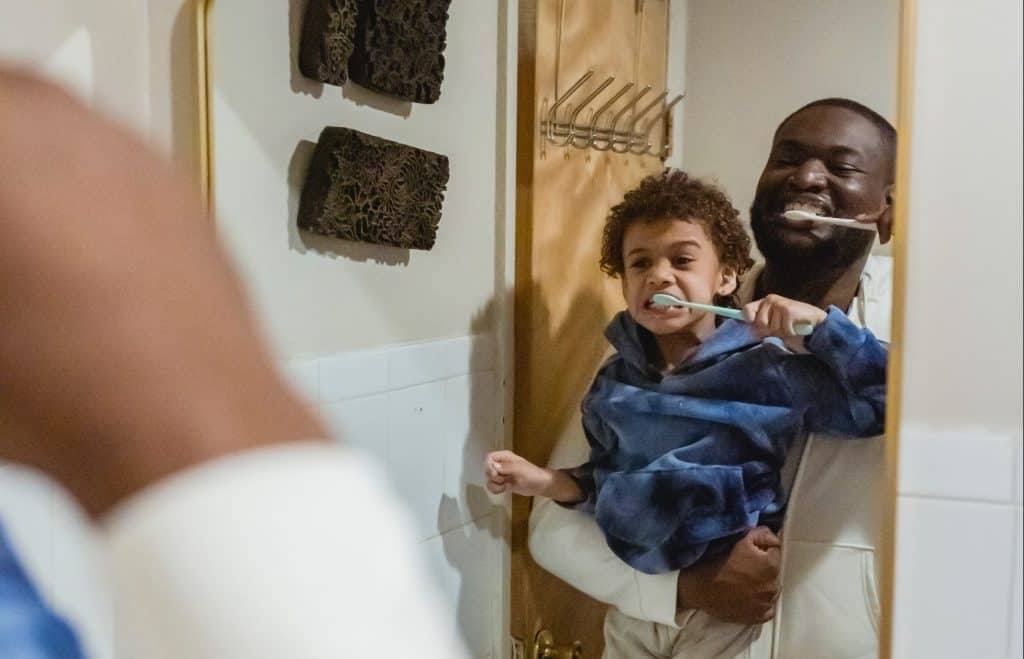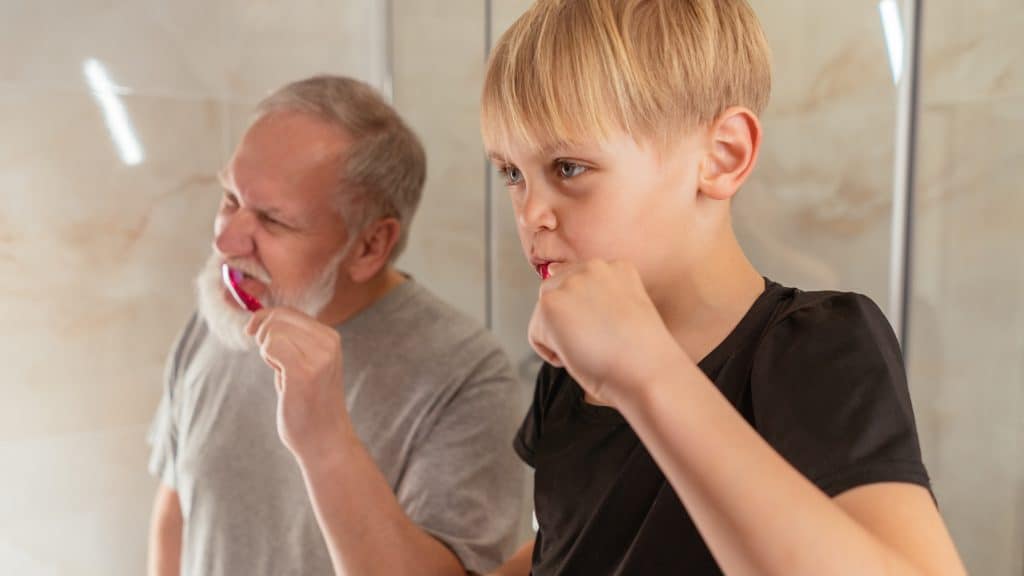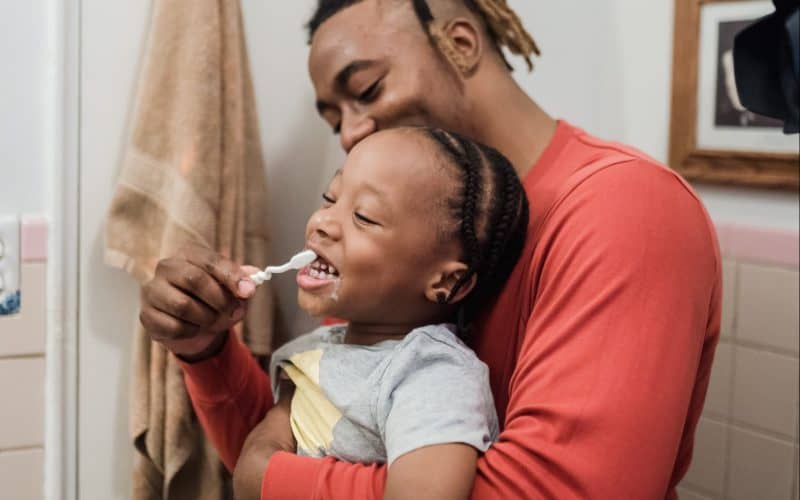Maintaining a young child’s oral health is no easy task. Many children enjoy eating sweets and drinking sugary drinks which aren’t the best for maintaining a healthy smile. Things get even harder when your toddler hates having their teeth brushed and puts up a fight whenever you try to brush their teeth.
Your toddler doesn’t have to love brushing their teeth. They do need to be able to tolerate teeth brushing well enough and long enough to keep their teeth clean and healthy. The best way to achieve this is to consistently make brushing seem like a positive or at least neutral part of a daily routine.
Brushing your toddler’s teeth doesn’t need to be a struggle. It might not be the easiest thing to accomplish with a toddler, but it is essential. Establishing good dental hygiene habits early on prevents dental disease and sets a child up with the foundation for a healthy smile for the rest of their life.
Remedies to Toddler Teeth Brushing Struggles
-
Start Young
Good oral habits should start before your toddler’s first tooth even comes in. The American Dental Association recommends dampening a soft, clean washcloth or a piece of gauze and using that to wipe down a baby’s gums at least twice a day, or ideally after every feeding.
This helps them get used to the sensation of having something rubbed against the inside of their mouth. Later, having a brush in their mouth won’t be such a foreign sensation anymore.
A toddler’s first tooth erupts between the ages of 4 to 7 months. A rice grain-sized amount of fluoride toothpaste on a baby toothbrush twice a day, once in the morning and again at night before bed is enough.
Their first dental checkup should also occur around this time, after the appearance of their first baby tooth and before their first birthday.
At 3 years old, most toddlers have a full set of 20 milk teeth. Most 3-year-olds already know how to spit, and you can now use a pea-sized amount of toothpaste on their teeth.
-
Model the Behavior

Toddlers love to mimic. If your toddler gets to see you brushing your teeth, they will be more likely to see teeth brushing as a good activity. While you brush your own teeth, talk about how important it is to keep the stinky bacteria off your teeth and how good and shiny your teeth look and feel when you’re done.
Lay out your toothbrushes side by side and brush your teeth together. Tell them how much fun you have brushing your teeth together and that you look forward to brushing your teeth with them again at the end of the day.
Have a contest to see who can brush their teeth the longest and who can make their teeth the cleanest and whitest. The enamel on baby teeth is usually whiter and opaquer than that of permanent teeth anyway, so this contest should be an easy win for them (not that they need to know that just yet).
-
Get Fancy
Children’s toothbrushes often come with all sorts of features that aim to make brushing feel like less of a chore. Bright colors, flashing lights, and sounds may be the key to keeping your toddler distracted long enough for you to brush their teeth. A choice between a manual and an electric toothbrush is also a good one to have.
Children’s toothpaste also comes in all sorts of flavors and colors. Pick up a couple of sample size or travel size tubes and have a taste testing where they can try out a new flavor every time they brush. tubes and have a taste testing where they can try out a new flavor every time they brush.
Drawings of their favorite characters on the tubes can also incentivize teeth brushing – “you know, (name of character) also uses this toothbrush/paste to brush their teeth. That’s why their picture is on the tube!”
Take your toddler to the store or have them look online to pick out a few that they like. They’ll probably end up with more than a few selections that will help them look forward and get excited when it comes time to brush.
-
Give Them Choices
Toddlers love finding new ways to express their independence. Their refusal to let you brush their teeth might be just one of the many ways they are expressing their newfound independence.
Giving them some choice in the brushing process allows them to feel more involved and active in the process. Tying into #3, having a few different toothbrushes and toothpaste flavors on hand at any given time for them to choose from might help ease the toddler teeth brushing struggle.
More independent toddlers might want to brush their teeth without your help. Try taking turns holding the toothbrush – “you get to hold the toothbrush first, but then mommy wants a turn with it too”. Make sure you continue to supervise them as they brush and inspect their teeth afterward to ensure a thorough brushing was done.
-
Turn It into a Game

End your toddler teeth brushing struggle by turning it into a fun game. Direct your toddler’s teeth brushing with a game of “Simon Says”. Take turns being Simon and use instructions like “Simon says, brush your front teeth in circles” and “Simon says, brush your back teeth back and forth.”
Find a tooth brushing song on YouTube and have a little dance party while brushing. Make up a silly dance and hum along to the melody. When the song ends, it’s time to spit and rinse!
Role play with a toy. All you’ll need is an extra toothbrush and a toy with some teeth that need to be brushed. A dentist play set that comes with its own dental model is a good option.
You can also use it to model what happens if teeth aren’t brushed properly – a bad tooth hurts a lot and turns yucky. The Crocodile Dentist that you find in many pediatric dental offices makes a good toy for this purpose.
-
Use Some Bribery
Sometimes, a post-brushing reward such as an episode of their favorite show or a few extra minutes on mom’s iPad before bed can be the difference between a quick 2-to-3-minute event and a full-on power struggle at the sink.
-
Use Rewards
Reward charts help toddlers learn important skills and stick to a routine, it can be a great way to end the toddler teeth brushing struggle. Parents use them for everything from potty training to getting dressed and learning to tie shoelaces. Using a reward chart to turn teeth brushing into a positive experience shouldn’t be any different. Usually, reward charts work best for children between 3 and 8 years old.
Involve your toddler in constructing the reward chart. Use stickers, magnets, pins, or anything else you’d like to mark the desired action, which in this case, is teeth brushing. Decide on a reward and how many times they need to brush their teeth to earn the said reward.
Hang up a reusable sticker board or magnetic board in the bathroom. Once they’ve accumulated a certain number of stickers or magnets, they can trade them in for an agreed-upon reward.
Keep in mind that while collecting stickers might be exciting at first, the novelty wears off quickly for young children. Keep goals short-term and the actual reward attainable in what a toddler considers to be a realistic time frame.
